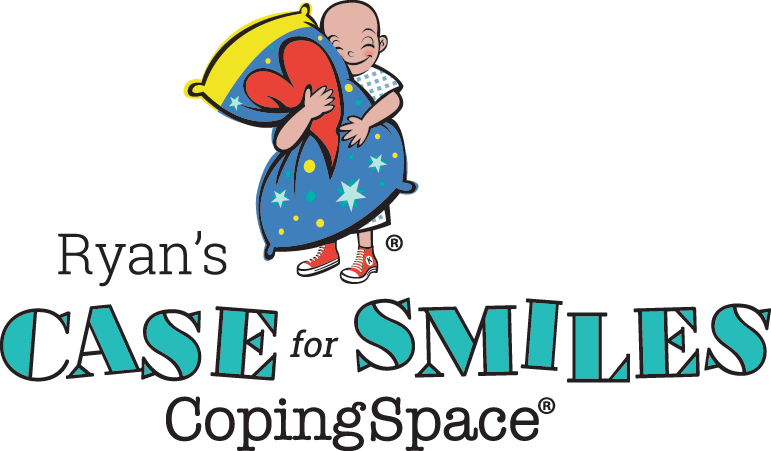BLOG
Supporting Parents Through a Child’s Medical Diagnoses: Spotlight on Case for Smiles’ Coping Space
Cindy Kerr / May 3, 2018/ Guest Blog on Child Life Mommy
 As child life specialists, you understand the importance of providing support to children and their families. So much of what you do every day – from addressing parent’s concerns about a diagnosis to helping kids find the words to express how they are feeling – is centered on advocacy and providing relief, which are both essential to fostering positive coping techniques.
As child life specialists, you understand the importance of providing support to children and their families. So much of what you do every day – from addressing parent’s concerns about a diagnosis to helping kids find the words to express how they are feeling – is centered on advocacy and providing relief, which are both essential to fostering positive coping techniques.
Ensuring that kids are at ease during hospital stays has personal importance to me. When my late son Ryan was diagnosed with osteosarcoma over a decade ago, I searched for ways to bring a smile to his face. One of the things I did was sew whimsical pillowcases to brighten up his hospital bed (you may have seen them at your hospital).
Ryan’s legacy lives on through the nonprofit organization Case for Smiles. Our mission is to help children and their families cope with the stresses of life changing childhood illness and injuries.
From the beginning, our primary focus has been on working with volunteers to sew and distribute pillowcases to children in hospitals (1.7M delivered to 362 hospitals so far), and it still is. However, we realized that there was more that could be done to provide emotional tools that promote healing. That is why we launched a comprehensive online resource called Coping Space, which is designed to help families, schools, communities, and health professionals find information on medical trauma.
The impetus for creating Coping Space came from what my family experienced after Ryan’s diagnosis. My life lost all sense of normalcy, and I worried about so many things when it came to Ryan and his two sisters, and of course my husband Gavin. During hospital visits, the staff was very helpful, but then I would come home and forget to take care of myself. I thought, like many moms do, that my role was to keep everything together. I pushed the anxiety and worry to the backburner and soldiered on, which in hindsight I realize wasn’t the best thing to do. To this day, I still experience symptoms of PTSD, which I now know isn’t uncommon.
Through my work, I’ve had the privilege to know leading Clinical Psychologist Dr. Anne Kazak, who writes extensively about the ongoing distress that some parents experience after a child’s illness. In one study that Dr. Kazak did on pediatric cancer, she found that 20% of families (30% of mothers) observed had at least one parent who had PTSD and posttraumatic stress symptoms (PTSS), which include:
- Reexperiencing the trauma through triggers
- Avoidance
- Feelings of emotional numbness
- Hyperarousal (jumpiness, altered sleep patterns, trouble concentrating, irritability, feeling threatened)
- Constant fears and anxiety
These shocking PTSD rates are comparable to combat veterans. However, there is hope. What research has found on a consistent basis is that symptoms of trauma can be lessened, and wellbeing optimized through coping methods aimed at reducing stress.
The resources at Coping Space were written in partnership with leading pediatric stress and cancer organizations who lent their expertise to help create content for the site: The Center for Pediatric Traumatic Stress (CPTS), co-located at the Children’s Hospital of Philadelphia (CHOP) and Nemours/Alfred I. duPont Hospital for Children; The Devereux Center for Resilient Children; and Alex’s Lemonade Stand Foundation.
We offer tips, strategies, and support that can be used before, during, and after a child’s hospital stay. The resources at Coping Space are continually updated and expanded, for instance, there is a blog where we hope to share coping stories. As child life specialists, you know that there are not many vetted online sources for information to share with young patients and their families. We are proud that Coping Spacewas created with extensive input from our Associate Director, who is trained as a child life specialist with knowledge of how effective the coping recommendations are at reducing symptoms of stress and trauma.
From the beginning, Coping Space was conceived to expand the focus from concentrating on the ill or injured child and their parents to reach a wider variety of audiences. Currently, the Coping Space resources are designed for children, siblings, parents, caregivers, the community, and schools. We also offer a special section on resilience because developing the ability to bounce back from adverse situations is critical to coping.
The work you do as child life specialists is invaluable. I understand the effort and time spent assembling materials to respond to a family’s needs. I also know that there is no one-size-fits-all coping solution. My hope is that Coping Space becomes a go-to place that provides comprehensive materials—digitally and in print—that you can use to help children, families, and friends cope with a life-changing diagnosis in childhood.
Visit Coping Space today at www.copingspace.org and be sure to follow on Facebook, Twitter, and Instagram.
